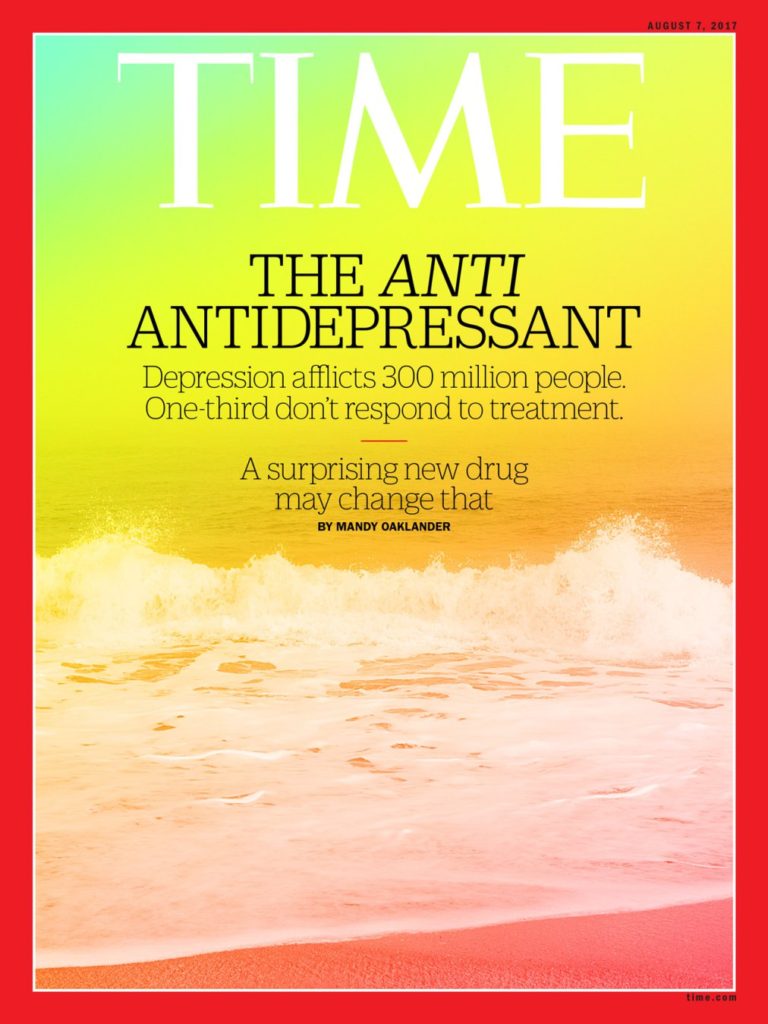 We have written our fair share of articles about Ketamine because we’ve seen the positive effects of this treatment for patients suffering from depression.
We have written our fair share of articles about Ketamine because we’ve seen the positive effects of this treatment for patients suffering from depression.
But, we are not the only ones who believe in the power of Ketamine.
Time Magazine recently published a story about Ketamine, calling the treatment a “new hope for depression.”
Highlights From the Time Magazine Ketamine Story
“In the past 20 years, I’ve not seen anything like this,” Dr. Cristina Cusin, a clinician and researcher who runs the Ketamine clinic at Massachusetts General Hospital was quoted as saying in the Time Magazine Ketamine story.
“Studies have shown that 60% to 70% of people with treatment-resistant depression respond to Ketamine.”
The response to this treatment was seen in patients with severe symptoms including those who have suicidal thoughts. “We have patients saying, ‘I’m exactly as depressed as I was before, I just don’t want to kill myself anymore,’” Cusin explained.
How Ketamine Treatment Changed One Patient’s Life
The article points to the fact that “there hasn’t been a major depression-drug breakthrough in nearly three decades, but a number of factors are conspiring to change that.”
Now, Ketamine is changing that.
Barbara Reiger, a 59-year-old woman who has battled depression since childhood, including having suicidal thoughts, spoke to Time about how things have changed for her since starting Ketamine treatments in 2015.
“I felt I was putting things in order, moving pieces of a puzzle around to make it all make sense,” Reiger explains.

Every six weeks or so, Reiger heads to a private Ketamine clinic, she puts an eye mask on and, while sitting on a recliner, she gets her deltoid injected with Ketamine. The treatment “doesn’t make her feel high, exactly, but she remembers that the first time she tried it, a grin and happy tears spread across her face.”
For Reiger, the treatments were a success. “I immediately felt relief … a lightness of the depression kind of lifting,” she recalls. Even more significant is that she felt this relief “in less than an hour.”
What Makes Ketamine Different From Other Antidepressants
The immediate relief that comes with Ketamine treatments is a huge benefit.
“Suicides in the U.S. [are] at their highest number in 30 years,” the Time Magazine Ketamine article reads. Accordingly, “patients need faster ways to feel better, without waiting the typical four to eight weeks it takes for antidepressants to kick in.”
“It’s been a paradigm shift, that now we can achieve rapid antidepressant effects,” Dr. Carlos Zarate, chief of the experimental therapeutics and pathophysiology branch at the National Institute of Mental Health and one of the foremost researchers of Ketamine, explained in the Time Magazine Ketamine story.
“Now, we know there’s something radically different.”
Researchers are still unsure how Ketamine works. In large doses, this drug is used as an anesthesia and its new form of usage was discovered comparatively recently — “discovered serendipitously in the late 1990s.” What researchers do know is that Ketamine “doesn’t target the standard antidepressant route of serotonin, norepinephrine and dopamine.”
What experts do think is that Ketamine “stimulates a series of receptors in the brain, kick-starting something called synaptic plasticity–the ability of parts of the brain to grow and change.” Antidepressants have been known to do so too but it seems that Ketamine does this “much more quickly–and much more powerfully.”
Working On A Ketamine-Like Drug
“Scientists are gaining a more nuanced picture of what depression is–not a monolithic disease, but probably dozens of distinct maladies–and they’re getting closer to learning what works for which kind of ailment.”
With Ketamine showing such powerful results, researchers are now working on breaking down its chemical structure to develop a Ketamine-like drug.
This is what Zarate and his colleagues at the National Institute of Mental Health are doing, reports Time. The researchers have “keyed in on a part of Ketamine’s chemical structure that they think is responsible for the drug’s antidepressant effects. Now they’re working on developing it as a treatment for depression.”
While it’s still in its early stages, Ketamine “has psychiatrists, long frustrated with their menu of available treatments, hopeful for the first time in years.”
More than for psychiatrists, there’s relief for people going through depression, especially those who have suicidal thoughts and are in danger of harming themselves.
Learn More About Ketamine
Loving Life Therapy offers Ketamine treatment in our offices in Tampa, Florida. We welcome local patients as well as people from around the country to see what Ketamine can do for them. To learn more about our process, success rates, team, and costs — please download our Ketamine Information Packet or call us today at 813-609-6946.

 Why You Should Choose a Holistic Chiropractor
Why You Should Choose a Holistic Chiropractor